
Viktor Mihály Orbán is a Hungarian politician who has served as prime minister of Hungary since 2010, previously holding the office from 1998 to 2002. He has presided over Fidesz since 1993, with a brief break between 2000 and 2003.
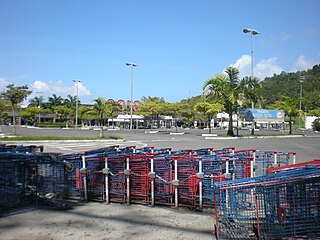
The 2009 French Caribbean general strikes began in the French overseas region of Guadeloupe on 20 January 2009, and spread to neighbouring Martinique on 5 February 2009. Both islands are located in the Lesser Antilles of the Caribbean. The general strikes began over the cost of living, the prices of basic commodities, including fuel and food, and demands for an increase in the monthly salaries of low income workers.
This is a list of crises situations and major protests in countries of Europe since the year 2000.
The 2011–2012 Palestinian protests were a series of protests in the Palestinian National Authority and the Hamas-ruled Gaza Strip, staged by various Palestinian groups as part of the wider Arab Spring. The protests were aimed to protest against the Palestinian government, as well as supporting the popular uprisings in Tunisia, Egypt and Syria. The first phase of protests took place during 2011 and the second phase in 2012.

The second government of Viktor Orbán or the Government of National Cooperation was the Government of Hungary from 29 May 2010 to 6 June 2014. Orbán formed his second cabinet after his party, Fidesz won the outright majority in the first round on April 11, with the Fidesz-KDNP alliance winning 206 seats, including 119 individual seats. In the final result, they won 263 seats, of which 173 are individual seats. Fidesz held 227 of these seats, giving it an outright majority in the National Assembly by itself.
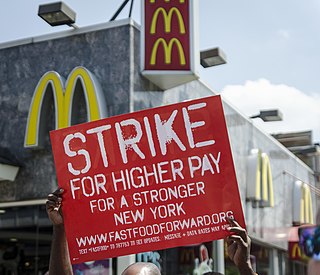
The Fight for $15 is an American political movement advocating for the minimum wage to be raised to USD$15 per hour. The federal minimum wage was last set at $7.25 per hour in 2009. The movement has involved strikes by child care, home healthcare, airport, gas station, convenience store, and fast food workers for increased wages and the right to form a labor union. The "Fight for $15" movement started in 2012, in response to workers' inability to cover their costs on such a low salary, as well as the stressful work conditions of many of the service jobs which pay the minimum wage.
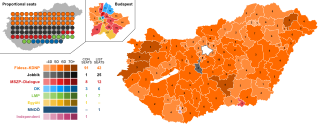
Parliamentary elections were held in Hungary on 8 April 2018. The elections were the second since the adoption of a new constitution, which came into force on 1 January 2012. The result was a victory for the Fidesz–KDNP alliance, preserving its two-thirds majority, with Viktor Orbán remaining Prime Minister. Orbán and Fidesz campaigned primarily on the issues of immigration and foreign meddling, and the election was seen as a victory for right-wing populism in Europe.

Since Emmanuel Macron was elected President of France on 7 May 2017, a series of protests have been conducted by trade union activists, left-wing activists and right-wing activists in opposition to what protesters consider to be neoliberal policies and globalism, his support of state visits by certain world leaders, his positions on French labour law reform, as well as various comments or policy proposals he has made since assuming the presidency.
The following lists events that happened during 2018 in Hungary.
The 2021 French labor protests were a series of protests and strikes organized by the General Confederation of Labour (France) (CGT), other trade unions, and French citizens dissatisfied with the country's economic and employment conditions in the wake of the COVID-19 pandemic. These were followed by protests against proposed laws that would give greater powers to police.
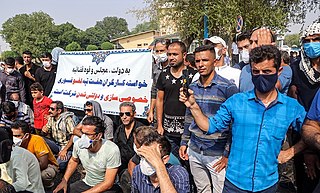
The 2017–2021 Iranian protests sparked by the 2016 Cyrus the Great revolt led to a series of political movements civil disobedience, online activism, and demonstrations followed by government crackdowns that since the mid-2010s have erupted nationwide in Iran, increasingly calling for regime change and overthrow of the Shiite political Islam and theocracy of the Islamic Republic of Iran, which began in 1979 following the Iranian Revolution.

The 2018 protests in Iran is mass protests and a popular uprising conspiring of peaceful demonstrations calling for better economic justice in June 2018 in Iran, the biggest wave of anti-government demonstrations since the 2017-2018 Iranian protests.
The 2021–2023 global energy crisis began in the aftermath of the COVID-19 pandemic in 2021, with much of the globe facing shortages and increased prices in oil, gas and electricity markets. The crisis was caused by a variety of economic factors, including the rapid post-pandemic economic rebound that outpaced energy supply, and escalated into a widespread global energy crisis following the Russian invasion of Ukraine. The price of natural gas reached record highs, and as a result, so did electricity in some markets. Oil prices hit their highest level since 2008.
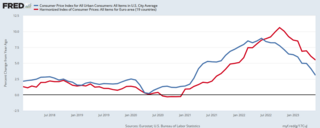
A worldwide increase in inflation began in mid-2021, with many countries seeing their highest inflation rates in decades. It has been attributed to various causes, including pandemic-related economic dislocation, supply chain problems, the fiscal and monetary stimuli provided in 2020 and 2021 by governments and central banks around the world in response to the pandemic, and price gouging. Recovery in demand through 2021 ultimately led to historic and broad supply shortages amid increasing consumer demand. Worldwide construction sectors were also hit.
Events in the year 2022 in Hungary.
During 2022 and 2023 there were food crises in several regions as indicated by rising food prices. In 2022, the world experienced significant food price inflation along with major food shortages in several regions. Sub-Saharan Africa, Iran, Sri Lanka, Sudan and Iraq were most affected. Prices of wheat, maize, oil seeds, bread, pasta, flour, cooking oil, sugar, egg, chickpea and meat increased. The causes were disruption in supply chains from the COVID–19 pandemic, an energy crisis, the Russian invasion of Ukraine and some effects of climate change on agriculture. Significant floods and heatwaves in 2021 destroyed key crops in the Americas and Europe. Spain and Portugal experienced droughts in early 2022 losing 60-80% of the crops in some areas.
Since late 2021, the prices for many essential goods in the United Kingdom began increasing faster than household incomes, resulting in a fall in real incomes. This is caused in part by a rise in inflation in both the UK and the world in general, as well as the economic impact of issues such as the COVID-19 pandemic, Russia's invasion of Ukraine, and Brexit. While all in the UK are affected by rising prices, it most substantially affects low-income persons. The British government has responded in various ways, such as by making provision for a £650 grant for households in receipt of means-tested benefits, a £150 council tax rebate, and implementing an Energy Price Guarantee.
A number of labour strikes, labour disputes, and other industrial actions have occurred in 2022.
The 2021–2022 global energy crisis has caused varying effects in different parts of the world.
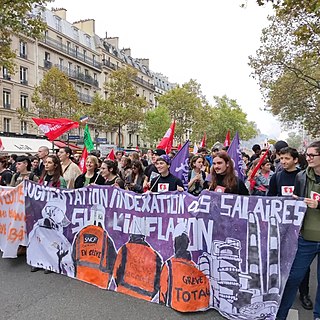
Thousands of people across France came to the streets in October 2022, launching a statewide strike against the rise in the cost of living. The demonstrations erupted following weeks of "walkouts" that have crippled oil refineries and caused gasoline shortages. The demonstrations have been described by Caroline Pailliez and Clotaire Achi of Reuters as the "stiffest challenge" for Emanuel Macron since his re-election in May 2022.










